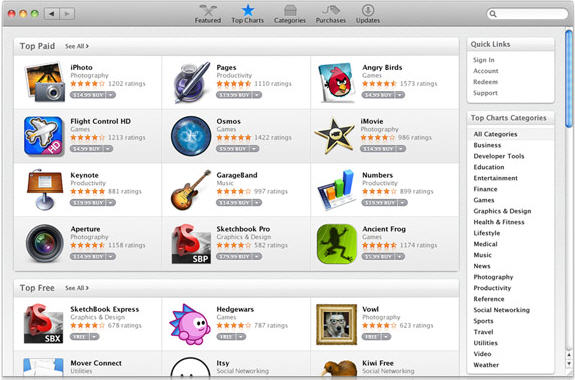The Mac App Store: Evaluating the pros and cons

This is a guest post from TechRepublic's Macs for Business blog. Here Vincent Danen, a member of works on the Red Hat Security Response Team, a Linux developer and veteran Mac user, weighs in on the pros and cons of the Mac App Store.
Back in October 2010, Apple announced that a Mac App Store was coming, and in January it delivered on its promise. The Mac App Store is similar to the iTunes App Store for iOS applications: it allows you to find, purchase, and update your Mac applications from one central location: the App Store application that was delivered as part of Mac OS X 10.6.6.

You can see this with the rules that developers must abide by for application acceptance in the App Store (http://developer.apple.com/appstore/guidelines.html for those with an appropriate developer account, and here for those without). There are a lot of stipulations here — a lot of ways for Apple to fully control what they distribute. Granted, they have the right to refuse and accept applications (it is their store, after all) and no one can rightfully complain since we can install applications in other ways, but what happens if, or when, Apple dictates that all future application distribution for OS X has to come through its store? A whole lot of useful applications won’t make the cut. And our choice, as users, would take a serious hit. Because they own the whole stack, this is a very real possibility.
There are some rules that simply don’t make sense. For one, discounted upgrade prices will no longer exist (i.e., paying a smaller upgrade fee for a new major version), and paid updates to the developer will be gone (said upgrade fee). So a developer must either make the application free for life, once it’s been paid, or submit it as a completely different application, without any upgrade benefits for long-time users (the same price for new and existing users).
Applications that require administrator privileges are not allowed. A whole class of useful utilities and applications are cut out of the App Store. VMware Fusion, for one, will never make it. Neither will applications like TinkerTool System (this one likely for multiple infractions).
Finally, my biggest problem with the App Store is the glaring omission of demo and trial downloads. In the App Store, you either buy the app or you don’t. There is no 24-hour trial, no three-day demo period to determine if you like the application or not. For a $0.99 app this isn’t really a big deal, but for a $20 app? How about a $50 app? Many of the big ticket items may have, for now, a demo version you can download from the developer’s web site to give it a trial run first. But if the store doesn’t tell the user this, how will they know? Does the omission of demos in the App Store prey on the ignorant? That’s what it feels like to me.
Sure, there are some benefits to the App Store. For many users, it’s a convenient and easy one-stop shop and while many may disagree with the App Store, there are enough people out there who have become accustomed to the experience, due to the App Store for iOS devices. It will certainly make searching for new applications easy, for those who choose to purchase as well as those who choose not to.
Perhaps the biggest benefit of the App Store is its ability to track and notify of updates. Gone will be the days of outdated and potentially vulnerable applications, because the App Store will diligently notify you of new applications. This will keep you up-to-date, which is a great thing from a security perspective. Another security-relevant benefit is that with all of these vendors, you are providing your credit card information to one company: Apple. You will not need to hand out your credit card to every payment handling company or system on a per-vendor basis. One company holds the information and they handle dispersing payment after you have paid them. This keeps your valuable credit card information from being in multiple systems, reducing potential exposure or loss. Similar in concept to PayPal, love them or hate them, this offers good consumer protection.
It will be interesting to see how the App Store progresses. As it is now, it looks useful, but time will tell how far Apple pushes this as a primary distribution channel. It also depends on developers: some may have multiple distribution channels, using the App Store as one means of making their applications available, but what about those who will use the App Store exclusively as their storefront?
An app that I looked at today, Pixelmator, is available in the App Store, and their web site indicated that the next major release would be exclusive to the App Store. So if you are a Pixelmator user, you will soon have no choice but to get the next major version from the App Store.
When all is said and done, I can’t say that I’m a big fan of the App Store. The success of the App Store for iOS devices pretty much made a similar mechanism for OS X a foregone conclusion. Its success, along with Apple’s need for absolute control, guaranteed that something like this was coming. I liked the fact that Apple’s Walled Garden had not reached OS X, and now that it’s here I’m very sceptical about what the future may hold. Apple doesn’t often have the best interests of users in mind. They have some great gear and some great software, but this kind of control just doesn’t sit well with me. I love the platform, but am keeping my options open. Time will tell what the next step for Apple is.
Source: Mac App Store pros and cons: What it means for developers and users